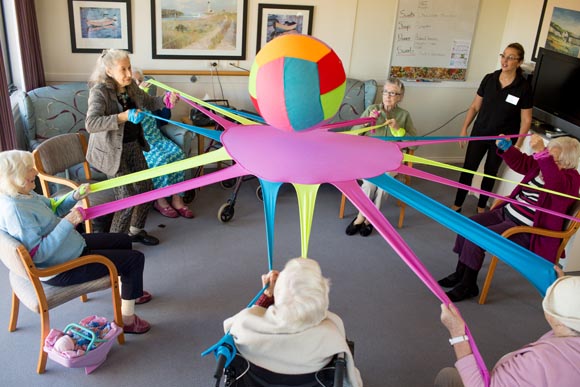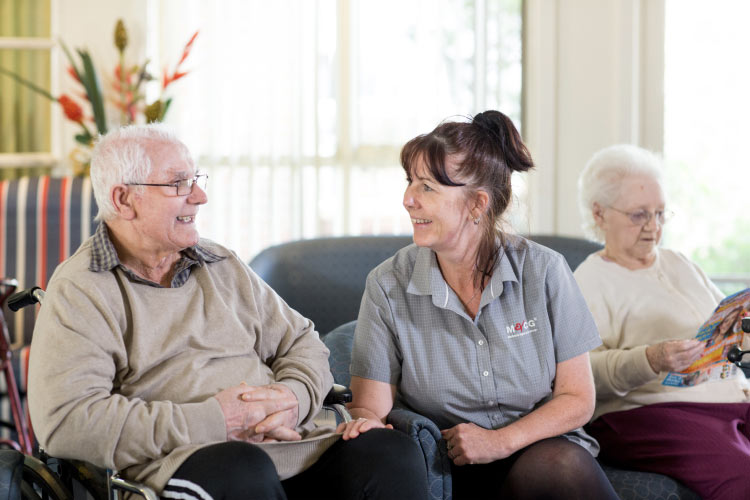I became, in my own mind, part of this family. And they've looked after me with all my needs and it's made me very happy.
Tai Chi (also known as Tai Chi Chuan) has many benefits for seniors, including improved balance and flexibility, increased strength and stamina, and better mental clarity. In addition, Tai Chi can help to reduce stress and anxiety levels and improve overall well-being. Our aged care facilities offer seated group physical activities for seniors.
We’re happy to answer any questions you have.
Tai Chi is an ancient Chinese practice that is often described as “meditation in motion.” The slow, flowing movements of Tai Chi can help to improve balance and flexibility, and the mind-body connection can also help to reduce stress and anxiety. For seniors, Tai Chi can be an excellent way to maintain physical and mental health.

Individual support

Core family values

Transparency and honesty

Education and training
Here is your guide to understanding aged care home fees.
In every aged care home, a basic daily fee is paid on top of your accommodation cost. This fee covers your basic living needs, including meals, laundry and cleaning, and utility costs like power and telecommunications.
The Australian Government sets a maximum basic daily fee that aged care facilities can charge, currently set at $54.69 a day or $19,961.85 per year.
Services Australia sets this fee at 85% of a single Age Pension. The basic daily fee is the same for everyone (even if they don’t receive an Age Pension) and is increased twice a year, March 20th and September 20th, to match the rising cost of living.
Once you submit an Income and Asset Assessment through Centrelink, you will not only be assessed on whether you are eligible for any subsidies but you’ll also be assessed on whether the means-tested care fee is applicable.
If you have to pay the income-tested care fee, it means the government has determined you need to pay extra towards your day-to-day care, but only if you can afford it. Whether this fee applies to you is dependent on your financial situation and if you have a higher level of assets or income. The means-tested care fee will be between $0 and $259.26 per day.
It can take the government some time to calculate the amount you may need to pay for the means-tested care fee. Therefore, you and the aged care home you choose will be notified by letter when the price has been calculated, and payment will be backdated to the date you entered into care.
All aged care providers can charge fees for your accommodation to cover the home's maintenance costs and amenities. Each nursing home sets this daily accommodation price, and it is advertised clearly in the accommodation cost. At MACG, our daily accommodation rate ranges between $27.62 and $88.55.
Many factors influence aged care accommodation costs, including the room size and type, facilities available and property prices. The Income and Asset Assessment will determine whether the Australian Government will subsidise this fee or fully pay for your accommodation costs based on your income earnings and assets.
Many aged care homes in Melbourne offer additional services, similar to a hotel experience. Some common additional services include beauty and hairdressing, satellite television, internet, gyms, pools, workshops and alcohol.
Some aged care homes may allow you to pick and choose the services you want, so you only pay for what you use, whereas others may have an additional package.
These service fees are set by the aged care provider and aren’t subsidised by the government. Therefore, it’s best to consider these as out-of-pocket costs you will need to cover.
Many aged care homes provide extra services that allow residents to upgrade their stay. Things that may be part of an extra service package include extended menus and drink options, higher quality linens and room furnishings.
Extra services usually come in a bundle and can either apply to specific room types or an entire retirement village. These extra services are not government subsidised.
The government provides a few aged care subsidy programs to assist residents who struggle to afford aged care support. The main program you can apply for is Financial Hardship Assistance. If you are eligible, the Australian Government will assist in paying some or all of your aged care fees (this includes respite care). Find out if you are eligible for Financial Hardship Assistance.
Our aged care facilities offer Tai Chi classes accessible to everyone. Our Tai Chi classes include the use of all the necessary equipment and the expertise of our experienced instructors. In addition, our facilities provide a safe and supportive environment for practising Tai Chi, with ample space and plenty of support from our staff. Contact us today to learn more.
Aged care staff are specially trained to support and assist seniors who wish to stay active and independent. One way they can do this is by promoting our health and wellness programs and helping seniors participate in Tai Chi exercises. Tai Chi is a Chinese martial art form involving slow, flowing movements. It is often taught in group classes, benefiting seniors who enjoy social activities.
Aged care staff can help seniors follow along with the movements and provide any necessary physical support. In addition, they can also offer encouragement and guidance, helping seniors to get the most out of the experience.
Our aged care facilities provide everything you need to support your ageing journey.
● 24-hour staffing with qualified care teams
● Care services to suit all needs and preferences
● Allied health services
● Meals cooked on-site and designed by dietitians
● Laundry cleaned on-site




We provide social and spiritual support programs to keep our residents active and happy.
● Meditation and relaxation
● Cultural and spiritual wellbeing
● Social, emotional, and pastoral support
● Memory and reminiscence programs
● Mobility, wellness and sensory programs
● Seated Tai Chi and walking groups
● Physiotherapy exercise classes
● Community giving, volunteering and fundraising
● Meal preparation and baking
● Music, movies, and travel exploration
● Pet and animal visits




Many of our residents like to give back to their local community, which we’re happy to facilitate.
● We work with charities such as Beyond Blue and Cancer Council Australia
● Each home supports a charity in the local region
● Residents can choose how to volunteer, such as baking, knitting and fundraising




The Income and Asset Assessment is a means test set by the Australian Government to decide if you are eligible for a Commonwealth subsidy for part or all of your aged care home fees.

In this means test, your income and assets are evaluated. What is considered ‘income’ includes but is not limited to financial investments, age, disability or service pensions, income support payments, bonds, shares, your superannuation, family trusts and super funds.
Assets include properties you own (including your own home), investment properties, private or partnered businesses, and more. You will be asked a range of questions regarding your income and assets to determine your eligibility for subsidies.

You can complete the Income and Assets Assessment online through My Aged Care.
The assessment is broken down into three steps and is fairly quick to complete. The same form is used for all support types, whether you’re looking for short or long-term care or support in the home.
To complete the assessment, you will need your Medicare card. You can also organise for a representative to complete the application on your behalf.

The online assessment should not take longer than 20 minutes of your time. However, after submitting the assessment, you will receive a call to arrange a complete evaluation and review of your application.
.jpeg)
There are three different ways you can pay your aged care fees:
MACG’s preferred method of payment is via direct debit. Therefore, a direct debit form will be provided to you during the pre-admissions meeting.
Monthly statements are issued to permanent residents (or their representatives) at the beginning of the month and detail the debit amount. This direct debit is processed on the 15th of every month (bar public holidays or weekends in which the payment will be taken the following business day).
If you have any questions about the admissions process, cost of care, or would like to book a tour, please contact our Admissions Team.

Boronia
Our residents enjoy a warm, homelike atmosphere at the foothills of the Dandenong Ranges.
Carrum Downs
Our residents live happy and fulfilled lives, and we help each person to achieve their best lifestyle.
Narre Warren
Read a good book in front of the warm fireplaces or explore the peaceful, landscaped gardens.
Narre Warren South
Our residents enjoy the beautiful gardens and a range of on-site facilities, including the chicken coop.
Ashwood
In the leafy suburb of Ashwood you will find Grand Cedar Aged Care. See for yourself what makes it special.
Coburg
Residents here appreciate the homelike atmosphere and enjoy the sun in the beautiful outdoor spaces.
Hughesdale
A warm and welcoming environment featuring old-world charm along with modern facilities.
Parkdale
This coastal home features views of Port Philip Bay and courtyards for our residents to enjoy.
Traralgon
Residents cherish the intimate relationships they have with the care team and the wider community.
Tai Chi is a form of mindfulness meditation in which practitioners are focused on the present moment and their bodily movements. Tai Chi exercise can help to increase feelings of calm and relaxation while reducing stress and anxiety. In addition, this exercise has been shown to improve cognitive function and reduce the risk of dementia. Finally, Tai Chi is a social activity that can help to reduce loneliness and isolation. All of these factors combine to make Tai Chi an effective tool for maintaining mental health.
Tai Chi is a low-impact form of exercise that can help improve balance and flexibility and increase muscle strength and stamina. Additionally, Tai Chi has been shown to reduce stress and anxiety, enhance sleep quality, and boost cognitive function and cardiovascular health. Because it is relatively gentle and requires no specialised equipment, Tai Chi is an ideal exercise for seniors. Furthermore, Tai Chi can be done in a group setting, providing social interaction and support. Tai Chi is an excellent option for seniors looking for an enjoyable way to improve their health and well-being.
It is generally recommended that seniors do Tai Chi at least three times per week. This moderate frequency enables them to maintain their current fitness level and achieve the other benefits of Tai Chi, such as improved balance and flexibility. However, some seniors may need to do Tai Chi more frequently to see results. As always, it is essential to consult a doctor before starting any new exercise regime.
If you find you’re unable to afford residential aged care costs, there are a number of avenues you can explore for assistance. If your Income and Asset Assessment determines you can’t afford aged care services, the Australian Government can provide subsidies for aged care support.
You may be eligible for Financial Hardship Assistance to partially or fully cover the basic daily fee, means-tested care fee and accommodation costs. Each case is assessed individually and depends on the type of care you need.
You can also consult with a Financial Information Services (FIS) representative. The FIS is an entirely free Australian Government program that helps you make informed decisions about your finances.

If you require assistance or more information, please contact any of the departments below.
You may also wish to gain specialist advice from an Aged Care Financial Planner to restructure your finances to your best advantage when entering care.

See your local MACG home and get a feel for the community.